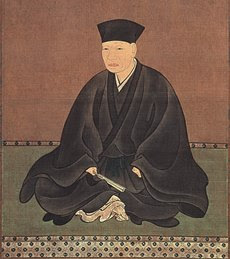Rikyū and the Yamazaki distillery

A couple of my recent posts have been a little bit beastly to Suntory [1,2], so I will write a nice one. One gets bored with the constant barrage of claims from distillers expounding the unique qualities of their waters, but in the case of Suntory's Yamazaki distillery there is a historical connection that is is worth talking about.
The Japanese know their water, they have been studying it for centuries, and nowhere is this more true than at Minasen, the area where Yamazaki gets its water. Minasen (literally "source of water") is an old redoubt of the Japanese tea ceremony or Cha no Yu (literally "water for tea"), a traditional art in which water is every bit as important as in distilling. The great tea master Sen no Rikyū (1522-1591) chose to have his tea house at Minasen.
It is a bit of a flight of fancy but I have been wondering whether Rikyū might have anything to say to whisky drinkers.
On connoisseurship
Rikyū is famed in tea circles for cultivating a quiet rustic simplicity. Once, somebody asked him what were the mysteries of tea. He replied:
Tea is nought but this.On equipment
First you make the water boil,
Then infuse the tea.
Then you drink it properly.
That is all you need to know
I was reading this excellent article on whisky glassware this morning. Rikyū:
If you have one potThis does not mean he disparaged the understanding of equipment. Quite the opposite. He lived in an era when certain antique tea pots could fetch the equivalent of hundreds of thousands of pounds. At one gathering of nobles admiring some such prized teaware, he interrupted:
And can make your tea in it
That will do quite well.
How much does he lack himself
Who must have a lot of things.
If you have no pot
Take a saucepan and in that
Boil your hot water.
Even so your tea may be
Quite the best in all Japan.
Though I tell you this
Do not go and hide away
Things you now possess.
To pretend you have them not
Is affected elegance.
Really sirs, this is most unbecoming talk. The connoisseurship of tea vessels consists in judging whether they are interesting and suitable for their purpose or not, and whether they combine well or badly with each other and has nothing to do with their age at all.
On morality and fakes
I was reading log entry 302 at Maltmadness.org about fake whiskies being sold for lots of money at auction houses which seem to be a little dilatory in stopping the fraud . Rikyū once bought a writing by the famous priest Mitsuan for a small fortune. He had a tea ceremony in its honour, to which he invited Kitamuki Dochin and another priest. Neither of them seemed to admire it, so Rikyū asked why. "Because it isn't genuine," came the reply. Whereupon Rikyū immediately burned the vastly expensive article, lest anyone else be fooled.
On blogs about whisky by whisky ignoramuses (ie. Nonjatta)
From Rikyū's 100 rules: "He is a fool who gives his opinion without suitable experience." But: "He who is ashamed to show ignorance will never be any good."
On lifeFrom Rikyū's 100 rules: "If you wish to follow the way of the Buddha, it is only this: Lead a life of leisure and don't take things seriously. That's the main thing."
On how to entertain guests by Hechikan, another great tea master
Rikyū was invited by Hechikan to visit him at the height of a desperately humid Japanese summer. He arrived to find no one to greet him and saw only a very small aperture by which to get into the tea room. Thinking this was typical of the rather extreme Hechikan, he struggled through the hole, only to find it was a trap: he was pitched headlong into a muddy pit. At this point, Hechikan appeared, expressing great regret at the great man's soiled condition. "We must get you a bath," he said. They went to the bath house and sat steeping in steaming hot water. Hechikan provided Rikyu with fresh clothes and they proceeded to the tea house where they were able to enjoy a wonderfully relaxed drink.
For more on Rikyu, including his tragic death, see Wikipedia. The image of Rikyu is taken from Wikipedia and is open source.
Most of my Rikyu quotes come from "Cha-no-Yu" by A.L. Sadler.
